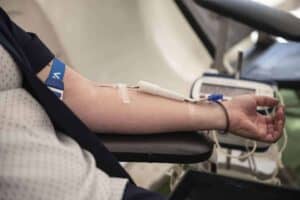Cancer requires a national strategy as its sustained demands on a healthcare system need through the line interventions.

Cancer is a leading cause of death worldwide, accounting for nearly 10 million deaths in 2020, according to the World Health Organisation.
It’s a disease, or collective of diseases, that has been at the forefront of medical research for decades, and science has been in a relentless pursuit to improve the quality of care and disease management for patients while simultaneously seeking cures.
We have all been impacted by cancer in one shape or another.
World Cancer Day this month was an appropriate time to recommit to the process. To seek solutions for a disease that must become more manageable – or even curable – and to improve the lives of those affected by it.
The global pharmaceutical and scientific community must pursue transformational and precision treatment technologies that deliver on these ideals.
There is another important aspect of cancer treatment in its current shape to consider. That is the care gap. Without bridging this, we will have fewer victories over cancer and, after all, that is the primary objective of every endeavour.
Cancer requires a national strategy as its sustained demands on a healthcare system need through the line interventions.
Often, in less privileged communities, access to diagnosis and treatment prove to be a significant challenge and major stumbling block in combatting the condition.
The International Cancer Control Centre has embarked on a process to mend disparities in the socioeconomic dichotomy of cancer treatment. It launched a three-year campaign to raise awareness and assist in the implementation of cancer control protocols.
The centre estimates that about 80% of countries have some form of protocol in place, but few fully implement it.
This could be due to funding challenges, geographic hurdles or stigma. Unfortunately, vulnerable populations are at the greater receiving end of these and associated problems.
Last year, the centre launched a tele-mentoring programme that debuted in Cameroon, Eswatini, India, Kenya, Malawi, Nigeria, Rwanda and Tanzania, working toward finding solutions through the identification of key stakeholder priorities, to create nation-specific cancer control plans.
This is especially key in a post-pandemic world where Covid has, at times, overwhelmed and on occasion diverted healthcare focus from other, longer term disease control.
It is this kind of work that lays a socioeconomic and clinical foundation for disease management. It is also the channel through which new treatments, novel protocols and patient care can be rolled out.
Its importance cannot be underestimated.
The role of nonprofit organisations is equally as important in the battle against cancer. In South Africa there are organisations and movements such as Cansa (Cancer Association of South Africa), Filotimo, the Breast Health Foundation and the Pink Drive, among many others that do tremendous work toward education, diagnosis and support for cancer patients and their families.
There is great need in other developing countries for organisations that do similar work. And we must forever show our gratitude in the progress made, every day, in many ways.
But victory over cancer requires a lot more than a national cancer protocol, research and development of treatments and regimes. It takes more than organisations lending support in all manner of ways and means.
It also takes the sum of the collective and that is where strength lies.
The pharma and scientific communities must collaborate more and work towards a holistic approach that satisfies need-based care in pursuit of every possible solution and positive outcome to assume victory.
While there’s much to be done, we can still celebrate the progress made thus far.
Plaza Muñoz is chief executive of Johnson and Johnson South Africa






